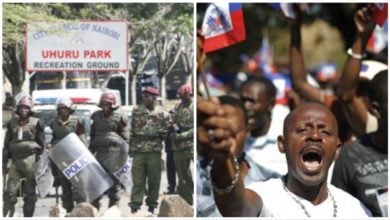Editor’s note: Bill Quigley, a human rights lawyer and law professor at Loyola University New Orleans, wrote the article below in the aftermath of hurricane Gustav. Since Quigley’s writing, the confirmed death toll in Haiti has grown into the hundreds, with Hurricane Ike marking the fourth major tropical storm to hit the country in four weeks.
The hardships wrought upon Haitians by these hurricanes build upon the hunger, poverty and repression of the ongoing U.N. military occupation of their country; the hardships in Louisiana compound U.S. government’s willful neglect of Katrina’s victims for the past three years and counting. Meanwhile, the U.S.-supported U.N. Mission in Haiti has a yearly occupation budget of nearly $500 million a year; the U.S. daily budget for the occupations of Iraq and Afghanistan has a comparable order of magnitude.

A man makes his way through the
flooded streets of Gonaives, Haiti,
Sept. 5.
A reasonable appreciation of these criminal priorities will bring into question how much of the present suffering of the working people of Louisiana, Haiti and other places impacted by the recent hurricanes can be attributed to “natural disasters.”
Bill Quigley can be reached at [email protected].
Hurricane Gustav killed 18 people in Louisiana and displaced 1.9 million. Over 800,000 homes are without electricity, nearly half the state, and some will not see power for up to a month.
In Haiti, Gustav killed 77 with another 8 missing and damaged nearly 15,000 homes. Tropical storm Hanna, which closely followed Gustav, killed at least another 60 people. Tens of thousands of people have sought safety on rooftops and temporary shelters. Rotting cows drift in the flood waters.
Louisiana is the poorest state in the U.S., home to nearly 4 million people, with per capita income of around $16,000 per year. Haiti is the poorest country in the Western Hemisphere, home to nearly 9 million people, with a per capita income of less than $400 per year.
In Louisiana, gas and water are scarce. On Thursday, Sept. 4, 2008, authorities reported a three-mile line of people waiting for food and water outside of New Orleans. The evacuation of 1.9 million people in Louisiana went relatively smoothly. The return has been much more difficult.
Reports from community organizations in Haiti say people have not eaten since Monday [Sept. 1]. Melinda Miles from Konpay reported: “Twenty-four hours of rain drenching the huts of the poor, perched on the cliffs, and drowning the slums, huddled on the edge of the sea. Homes were washed away by overflowing rivers, and others had flash floods tear through their walls. Fields of plantain trees are now stagnant puddles—breeding ground for mosquitoes—and agricultural fields were destroyed throughout the region. Almond trees floated into the sea and coconut trees were uprooted.”
Tens of thousands of people in Louisiana remain displaced. A thousand people in one shelter reported there were no bathing facilities at all. People washed up in a bucket. Another shelter reported 30 people arrested outside a nearby convenience store. Buses will start bringing people back on Friday [Sept. 5].
Haiti was in deep trouble before being hit by a series of storms. Hunger is widespread. Sky-high food prices sparked riots and turmoil as people could not afford to purchase enough food.
Louisiana had not yet recovered from Hurricane Katrina, three years ago. New Orleans still has over 65,000 vacant and abandoned homes and over 100,000 fewer people since Katrina. Many of the elderly, disabled and African-American working poor remain displaced.
“There is no food, no water, no clothes,” the pastor of a church in Gonaives, Arnaud Dumas told the Associated Press. “I want to know what I’m supposed to do. … We haven’t found anything to eat in two, three days. Nothing at all.”
Critics question why prisoners in New Orleans were returned by public transportation days before tens of thousands of citizens had the same opportunity.
President René Préval of Haiti told Reuters: “We are in a really catastrophic situation. There are a lot of people on rooftops and there are prisoners we cannot guard.” In Gonaives, a city of 160,000, half the homes remain flooded, according to U.N. troops. People begged for food and water outside the U.N. troop base.
“All and all, the response has been excellent,” U.S. President Bush told the nation. The U.S. Embassy in Haiti announced it was releasing $100,000 in emergency aid to Haiti.
In Haiti, the situation is critical. “If they don’t have food, it can be dangerous,” Haitian Senator Youri Latortue told the AP. “They can’t wait.”
“We expect a surge of evictions and power cutoffs,” said Brother Don Everard of Hope House, a social service agency in New Orleans. “People were having trouble making rent and utilities before evacuating for Gustav, now it will be worse because they have spent all their money to evacuate.”
Haiti is 1,300 miles away from New Orleans. Other hurricanes are now approaching the Caribbean.






